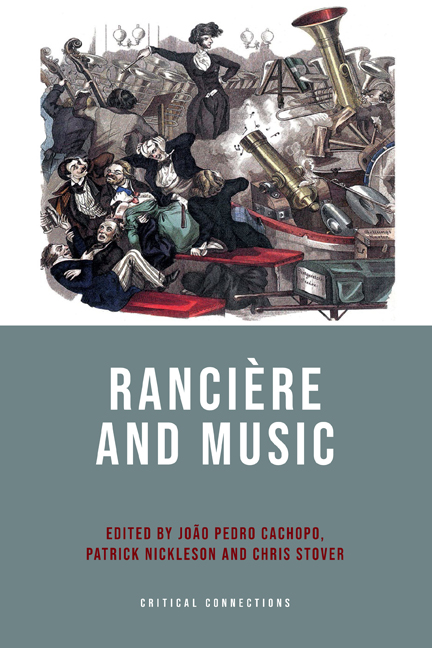Book contents
- Frontmatter
- Contents
- List of Examples
- Acknowledgements
- Notes on Contributors
- Introduction
- Part I: Music and Noise
- 1 Musique concrète and the Aesthetic Regime of Art
- 2 ‘Rip it up and start again’: Reconfigurations of the Audible under the Aesthetic Regime of the Arts
- 3 A Lesson in Low Music
- Part II: Politics of History
- 4 Wandering with Rancière: Sound and Structure under the Aesthetic Regime
- 5 Staging Music in the Aesthetic Regime of Art: Rancière, Berlioz and the Bells of Harold en Italie
- 6 Rancière on Music, Rancière’s Non-music
- 7 Coloured Opera and the Violence of Dis-identification
- Part III: Politics of Interaction
- 8 Musical Politics in the Cuban Police Order
- 9 Rancière and Improvisation: Reading Contingency in Music and Politics
- 10 Rancière’s Affective Impropriety
- Part IV: Encounters and Challenges
- 11 Rancière, Resistance and the Problem of Commemorative Art: Music Displacing Violence Displacing Music
- 12 Stain
- 13 On Shoemakers and Related Matters: Rancière and Badiou on Richard Wagner
- 14 Roll Over the Musical Boundaries: A Few Milestones for the Implementation of an Equal Method in Musicology
- Afterword
- A Distant Sound
- Works Cited
- Index
7 - Coloured Opera and the Violence of Dis-identification
Published online by Cambridge University Press: 03 October 2020
- Frontmatter
- Contents
- List of Examples
- Acknowledgements
- Notes on Contributors
- Introduction
- Part I: Music and Noise
- 1 Musique concrète and the Aesthetic Regime of Art
- 2 ‘Rip it up and start again’: Reconfigurations of the Audible under the Aesthetic Regime of the Arts
- 3 A Lesson in Low Music
- Part II: Politics of History
- 4 Wandering with Rancière: Sound and Structure under the Aesthetic Regime
- 5 Staging Music in the Aesthetic Regime of Art: Rancière, Berlioz and the Bells of Harold en Italie
- 6 Rancière on Music, Rancière’s Non-music
- 7 Coloured Opera and the Violence of Dis-identification
- Part III: Politics of Interaction
- 8 Musical Politics in the Cuban Police Order
- 9 Rancière and Improvisation: Reading Contingency in Music and Politics
- 10 Rancière’s Affective Impropriety
- Part IV: Encounters and Challenges
- 11 Rancière, Resistance and the Problem of Commemorative Art: Music Displacing Violence Displacing Music
- 12 Stain
- 13 On Shoemakers and Related Matters: Rancière and Badiou on Richard Wagner
- 14 Roll Over the Musical Boundaries: A Few Milestones for the Implementation of an Equal Method in Musicology
- Afterword
- A Distant Sound
- Works Cited
- Index
Summary
In the day [Jimmy Momberg] polishes the floors of the City Hall. Night time he sings the leading role … And we always used to joke among ourselves and say to him: ‘Jimmy, you really polish up that front part nicely, not so, [sic] because you’re standing there tonight!’
Jimmy Momberg's story defies the neat categorisations of apartheid classification. Marked by the state as a so-called coloured body, Momberg was employed as a cleaner at the Cape Town City Hall, the kind of vocation deemed too lowly for a white man in apartheid South Africa. At night, he stepped on to the very same stage, not as a cleaner, but as one of the stellar soloists of the Eoan group, South Africa's first grassroots company to perform full-scale operas. This chapter draws on the work of Jacques Rancière to understand better the suturing of aesthetics and dissensual politics acted out by the Eoan group. More importantly, it will set scenes from the Eoan archive to work on Rancièrean thought to render visible the limits and omissions that his avowedly Eurocentric premises are at risk of normalising. Commenting on the Eurocentric underpinnings of Rancière’s work, decolonial theorist Walter Mignolo writes that ‘[Rancière’s] examples never cross the Mediterranean toward the south of Italy, neither does he go toward the east of Greece, and never to the north of Germany’. Mignolo's observation is not entirely accurate. In The Emancipated Spectator, Rancière traverses the destitute geographies of Rwanda, Sudan, Cambodia and Palestine. Yet these examples often serve only a demonstrative purpose in Rancière's conception of politics and aesthetics, formulations that have theoretical origins in his earlier writings, notably his research on nineteenth-century French worker archives.
Despite this demonstrative presence, there is little in Rancière’s published writings that could act as a postcolonial antidote to his largely Eurocentric focus. This is not surprising if one considers his reluctance to state the problem of politics in terms of postcolonial identity. Rancière concedes that his interest has not been in formulating a theory of the subject (postcolonial or otherwise), but in the ‘process of subjectification’ as a form of dis-identification.
- Type
- Chapter
- Information
- Ranciere and Music , pp. 156 - 174Publisher: Edinburgh University PressPrint publication year: 2020



